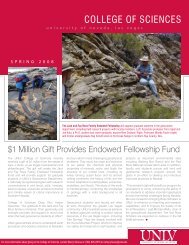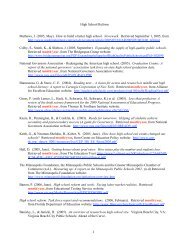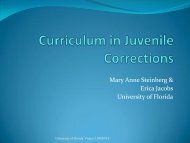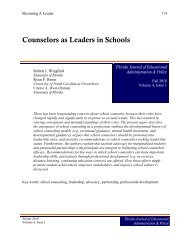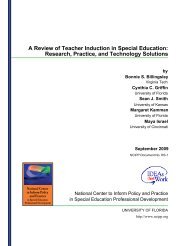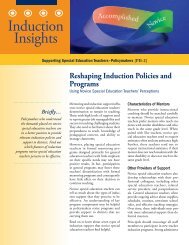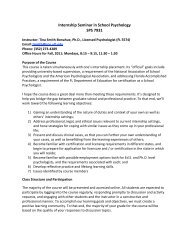Editor's Column - College of Education - University of Florida
Editor's Column - College of Education - University of Florida
Editor's Column - College of Education - University of Florida
Create successful ePaper yourself
Turn your PDF publications into a flip-book with our unique Google optimized e-Paper software.
Editor’s <strong>Column</strong>69Editor’s <strong>Column</strong>Linda S. Behar-Horenstein<strong>University</strong> <strong>of</strong> <strong>Florida</strong><strong>Florida</strong> Journal <strong>of</strong> <strong>Education</strong>alAdministration & PolicySummer 2010Volume 3, Issue 2Today's schools are characterized in part by cultural discontinuity and hegemony thatmarginalizes and disenfranchises groups and classes <strong>of</strong> people. Because <strong>of</strong> their prevalence in USschools, forthcoming issues in the <strong>Florida</strong> Journal <strong>of</strong> <strong>Education</strong>al Administration will focus onculturally responsive school leadership and how it can ensure that school experiences afford equalopportunities for all students. To become a culturally responsive leader, individuals should cometo understand their own assumptions, beliefs and values about people and cultures different fromtheir own (Terrell & Lindsay, 2009). They must become cognizant <strong>of</strong> the personalitycharacteristics, values and mores that are important to their faculty and staff.The prevalence <strong>of</strong> diversity in most U.S. schools provides good reason to train and prepareschool leaders to be fully cognizant, appreciative and motivated to promote culturally responsiveinstructional practices (Growe et al., 2002). According to the National Association for <strong>College</strong>s <strong>of</strong>Teacher <strong>Education</strong> (NACTE) Leadership standard (7.4) it is the responsibility <strong>of</strong> school leaders to"…promote multicultural awareness, gender sensitivity and racial and ethnic appreciation” (citedin Growe et al., 2002). School leaders must actively involve faculty, staff and students and pursuethis resolutely by creating environments whereby the values <strong>of</strong> different cultures are understoodand appreciated.Limited experience and training in multiculturalism cannot allow school leaders to havecomfort and competence in dealing with issues concerning student diversity, and it may be asource <strong>of</strong> frustration for those who do not possess that sensitivity and training. <strong>Education</strong>alleadership programs can lessen this burden by ensuring that prospective school leaders have thecapacity to lead in culturally responsive ways. Hansman et al. (1999) cited in Growe et al. (2002),suggested that the preparation <strong>of</strong> such school leadership include multicultural educational courseswhere active discussions on such issues are encouraged. An essential portion <strong>of</strong> such courseswould be content integration, including the incorporation <strong>of</strong> content and examples from othercultures to illustrate key concepts. However, a mere understanding <strong>of</strong> cultural differences is notenough. School leaders must promote environments whereby the stakeholders appreciate, respect,tolerate, and explore differences within the diverse groups, provide a sense <strong>of</strong> belonging,acceptance, and a possibility <strong>of</strong> acquiring their full potentials. A mentality <strong>of</strong> “us” and “them”, aswell as “superiority” and “inferiority” can only be overcome when strong leaders practice theirSummer 2010Volume 3, Issue 2<strong>Florida</strong> Journal <strong>of</strong> <strong>Education</strong>alAdministration & Policy
Editor’s <strong>Column</strong>70beliefs in terms <strong>of</strong> school recruitment, hiring, and promotion practices, and create appropriateaward systems.School leaders must acquire the skills needed to differentiate leadership practices (Duke,2010). Becoming aware <strong>of</strong> student achievement, past and present, considering the welfare <strong>of</strong> theentire school and having the courage to make organizational changes are critical for culturallyresponsive school leaders. Differentiating leadership begins with an examination <strong>of</strong> school-widepractices to determine if instruction is geared towards student learning needs and if there is anoverreliance on retention as an intervention. In low performing and declining schools, leadersmust direct faculty to focus on promoting literacy among students with limited Englishpr<strong>of</strong>iciency and those who are non-readers or emergent readers. Providing high quality instructionfor students with the highest academic needs means that school leaders demonstrate their capacityto change dysfunctional attitudes, beliefs and instructional practices. At times, school leaders mayhave to confront teachers about their instructional competence. While this is not an easy task, it isessential to providing high quality instruction.Providing teachers with appropriate pr<strong>of</strong>essional development opportunitiescommensurate with their skills and needs is also essential. For example, if teachers are unaware <strong>of</strong>students' backgrounds, pr<strong>of</strong>essional development could focus on helping them develop thatawareness and demonstrate how to relate the content to students' cultural backgrounds. Researchshows that working with students, expanding their experiences and knowledge base, rather thanprescribing interventions is more likely to motivate them. Providing students with this type <strong>of</strong>instructional motivation is culturally responsive teaching (Grober et al., 2006; Gay, 2000; Ladson-Billings, 1994; Nieto, 2002/2003 cited in Ambe, 2006).Lucas & Villegas (2007) suggest that constructivist teaching is more likely than directinstruction, or teacher-centered approaches to bring about culturally responsive teaching. Byworking with school liaisons, culturally responsive school leaders can ensure that teachers investtime to learn more about students' families and background and enhance their efforts to provideconstructivist teaching. Teacher education programs can contribute to this mission by ensuringthat prospective teachers have socio-cultural consciousness and affirming views towardsdiversity. Teachers, the majority <strong>of</strong> whom are from English speaking, white, middle-classbackgrounds, need to see the inequities in society, examine their own positionality and privilege,and feel that they have an ethical obligation to help all students, while serving as their advocates.Historically, research and training on school leadership and consultation has maintainedthe norms <strong>of</strong> the white middle-class. Even those principals who wanted to promote diversity havefound little support to their efforts. Pena (1996) recommends that school leaders consideremploying structural consultation strategies that reflect the interests, values and beliefs <strong>of</strong>educators, school personnel, students, and parents and schedule meetings to discuss school-wideissues with these stakeholders. Other researchers have recommended deconstructing schools andrebuild them differently after close examination (Blasé, 1991 cited in Pena, 1996). Ladson-Billings (cited in Ambe, 2006) recommends that successful school leaders and teachers <strong>of</strong>minority/diverse student populations focus on students' strengths rather than weaknesses.Classroom teaching that is tailored to the diverse background <strong>of</strong> its students, that showcases avariety <strong>of</strong> instructional strategies including visual aids, assignments, multiple perspectives,speeches, various attitudes, and other practices, is designed to promote student success. HavingSummer 2010Volume 3, Issue 2<strong>Florida</strong> Journal <strong>of</strong> <strong>Education</strong>alAdministration & Policy
Editor’s <strong>Column</strong>71knowledge <strong>of</strong> classroom instruction is one arena in which culturally responsive school leaders canhave considerable impact.Most researchers and educators agree that training and preparation affects practice.Therefore, educational leadership programs should provide learning experiences that allowstudents to understand their own assumptions, beliefs and values about people and culturesdifferent from their own, and to learn about the assumptions, beliefs and values held by peoplefrom cultures different from their own. To acquire these skills, perhaps during their principalinternship course, students should work in schools comprised by people from different cultures sothat they can begin to develop culturally responsive leadership practices. The appreciation andsupport <strong>of</strong> diverse groups in educational institutions rests largely with the leadership and theirattitudes towards multiculturalism. The recognition and pursuit <strong>of</strong> these characteristics isimperative in the fast-shrinking local, national and global boundaries and our increasinglyculturally diverse communities (Ambe, 2006; Goddard, 2007).Summer 2010Volume 3, Issue 2<strong>Florida</strong> Journal <strong>of</strong> <strong>Education</strong>alAdministration & Policy
Editor’s <strong>Column</strong>72ReferencesAmbe, E. B. (2006). Fostering Multicultural Appreciation in Pre-service teachers throughmulticultural curricular transformation. Teaching and Teacher <strong>Education</strong>, 22, 690.Brodbeck, F., C., Frese, M., Akerblom, S., & Audia, G. (2000). Cultural Variation <strong>of</strong> LeadershipPrototypes Across 22 European Countries. Journal <strong>of</strong> Occupational and OrganizationalPsychology 73, 1-29.Casimir, G., & Waldman, D. A. (2007). A Cross Cultural Comparison <strong>of</strong> the Importance <strong>of</strong>Leadership Traits for Effective Low-level and High-level Leaders. International Journal<strong>of</strong> Cross Cultural Management, 7(1), 47-60.Duke, D. (2010). Differentiating School Leadership: Facing the Challenge. Thousand Oaks, CA:Corwin Press.Gay, G. (2000). Culturally Responsive Teaching: Theory, Research, and Practice. New York,NY: Teachers <strong>College</strong> Press.Goddard, J. T. (2007). School Leadership and Equity: Results from an International ComparativeStudy. School Leadership and Management, 27(1), 1-5.Growe, R., Schmersahl, K., Perry, R., & Henry, R. (2002). A Knowledge Base for CulturalDiversity in Administrator Training. Journal <strong>of</strong> Instructional Psychology, 29(3), 205-212.Hansman, C. A., Spencer, L., Grant, D., & Jackson, M. (1999). Beyond Diversity: DismantlingBarriers in <strong>Education</strong>. Journal <strong>of</strong> instructional psychology. 26(1), 16.Kirby, P. C., & Blasé, J. J. (1991). Teachers' Perceptions <strong>of</strong> Principals Affect CollaborativeEfforts. NASSP bulletin 75 (538), 111-115.Ladson-Billings, G. (1994). The Dreamkeepers: Successful Teachers <strong>of</strong> African AmericanChildren. San Francisco: Jossey Bass.Lucas, T., & Villegas, A., M. (2007). The Culturally Responsive Teacher. <strong>Education</strong>alLeadership, 28-33.Pena, R. A. (1996). Multiculturalism and <strong>Education</strong>al Leadership: Keys to Effective Consultation.Journal <strong>of</strong> <strong>Education</strong>al and Psychological Consultation 7(4), 315-325.Terrell, R. D., & Lindsay, R. B. (2009). Culturally Pr<strong>of</strong>icient Leadership. Thousand Oaks, CA:Corwin Press.Linda S. Behar-Horenstein, Ph.D., is a Distinguished Teaching Scholar and Pr<strong>of</strong>essor at the<strong>University</strong> <strong>of</strong> <strong>Florida</strong>.Summer 2010Volume 3, Issue 2<strong>Florida</strong> Journal <strong>of</strong> <strong>Education</strong>alAdministration & Policy
<strong>Florida</strong> Journal <strong>of</strong> <strong>Education</strong>alAdministration & PolicySummer 2010Volume 3, Issue 2<strong>Editor's</strong> <strong>Column</strong>69 – 72Linda S. Behar-HorensteinAssessment Versus Achievement: Winner Takes All!73 – 85Marsha SimonTeachers and Students’ Academic Performance in NigerianSecondary Schools: Implications for Planning86 – 103A. Olatoun AkinsoluBook Review104 – 109Kevin TateAfrican American Perspectives on Leadership in Schools: Building aCulture <strong>of</strong> Empowermentby Foster, L. & Tillman, L. C.Summer 2010Volume 3, Issue 2<strong>Florida</strong> Journal <strong>of</strong> <strong>Education</strong>alAdministration & Policy
<strong>Florida</strong> Journal <strong>of</strong> <strong>Education</strong>al Administration & PolicyEditorLinda S. Behar-Horenstein, Ph.D.Distinguished Teaching Scholar and Pr<strong>of</strong>essor<strong>University</strong> <strong>of</strong> <strong>Florida</strong>Assistant EditorKellie W. Roberts, Doctoral Student<strong>Education</strong>al Administration and PolicyEditorial BoardLee Ann Lehman, Doctoral CandidateSchool PsychologyLian Niu, Doctoral Student<strong>Education</strong>al Administration and PolicyRobert J. Wingfield, Doctoral StudentSchool PsychologyMueen Zafar, Doctoral Student<strong>Education</strong>al Administration and PolicyThe <strong>Florida</strong> Journal <strong>of</strong> <strong>Education</strong>al Administration & Policy is published biannually, in Falland Spring, by the Department <strong>of</strong> <strong>Education</strong>al Administration & Policy at the <strong>University</strong> <strong>of</strong><strong>Florida</strong>. The contents <strong>of</strong> the journal may be located at www.fjeap.org or by visiting thedepartment’s webpage at www.education.ufl.edu/leadership.The <strong>Florida</strong> Journal <strong>of</strong> <strong>Education</strong>al Administration & Policy is an online, blind, peerreviewedjournal published by the Department <strong>of</strong> <strong>Education</strong>al Administration & Policy atthe <strong>University</strong> <strong>of</strong> <strong>Florida</strong>’s <strong>College</strong> <strong>of</strong> <strong>Education</strong>. The journal serves as an outlet forpoignant and rigorous research and study, as well as providing a venue for quality researchreviews and thought provoking commentaries.© 2010 by the Department <strong>of</strong> <strong>Education</strong>al Administration and Policy in the School <strong>of</strong>Human Development and Organizational Studies in <strong>Education</strong>.Summer 2010Volume 3, Issue 2<strong>Florida</strong> Journal <strong>of</strong> <strong>Education</strong>alAdministration & Policy





